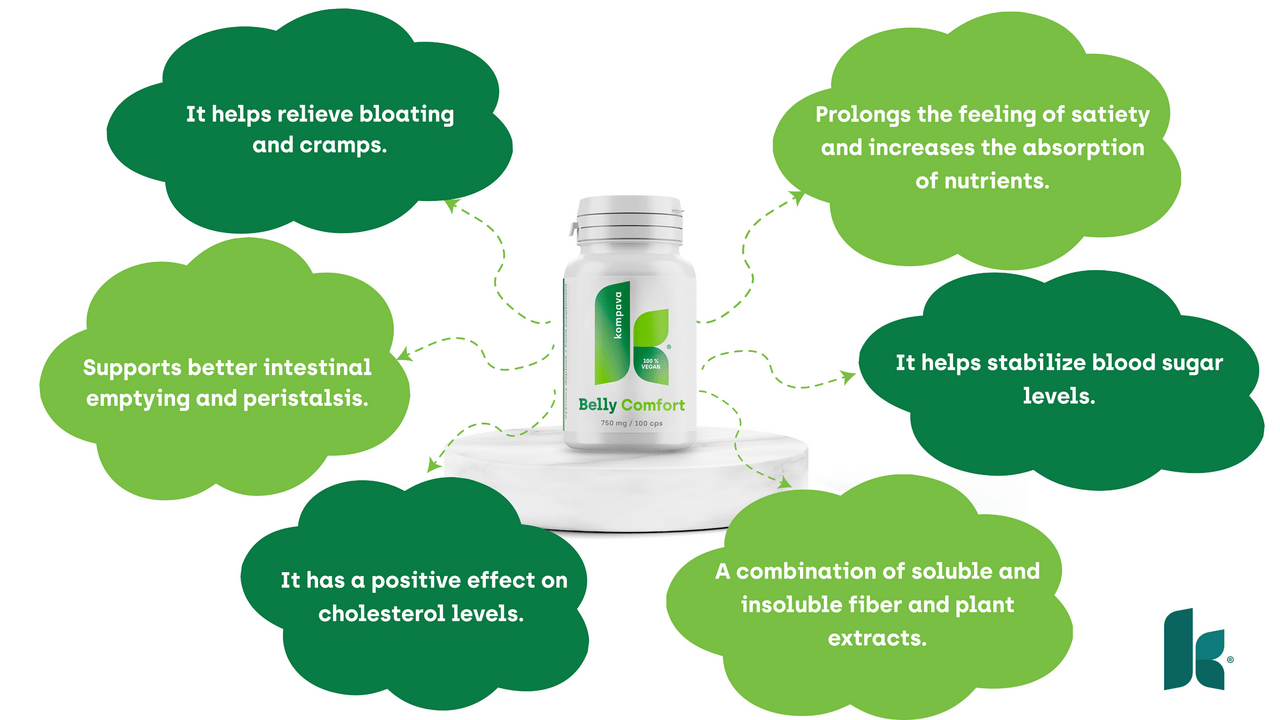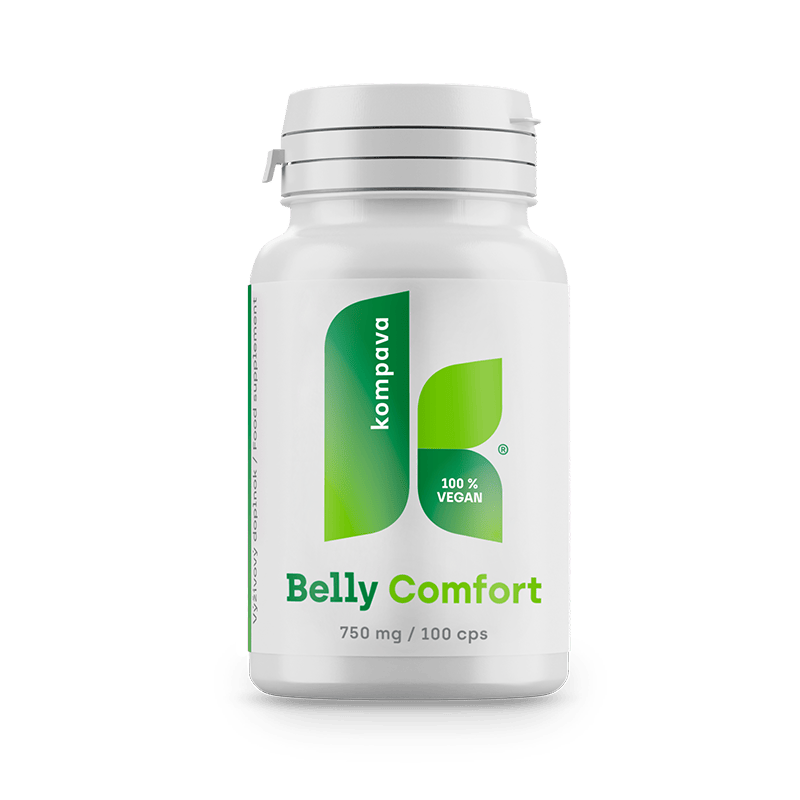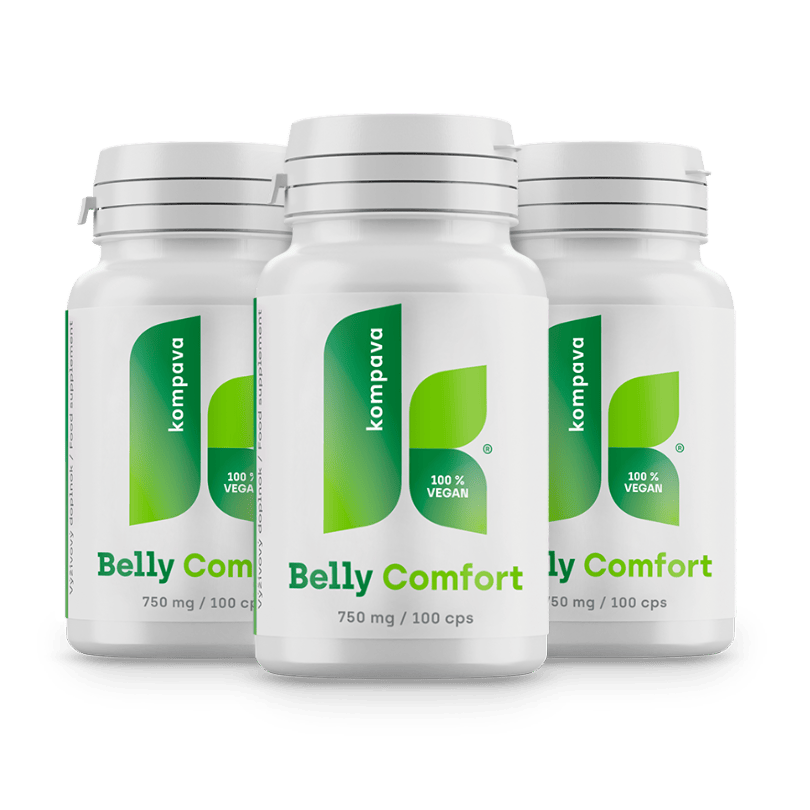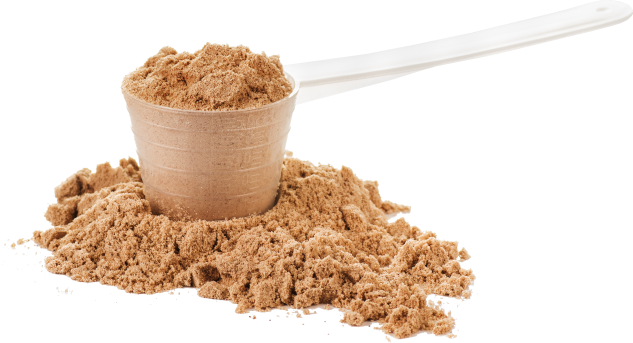
Belly Comfort is a 100% natural product that combines soluble and insoluble fiber. This combination helps bind impurities in the digestive tract, reducing their contact with the intestinal mucosa and preventing their absorption into the body. Regular use supports intestinal cleansing from deposits caused by poor diet or stress and contributes to better digestive comfort.
Soluble fiber forms a gel-like mass in the stomach, slowing digestion, prolonging the feeling of fullness, and increasing nutrient absorption. Additionally, it positively affects cholesterol levels and helps stabilize blood sugar levels.
To maximize the beneficial effects of fiber, it is recommended to drink plenty of water.

Belly Comfort contains an effective blend of plant extracts that support healthy digestion. It helps maintain intestinal microflora balance, contributes to soothing irritation of the digestive tract mucosa, and naturally stimulates the production of digestive juices. By supporting intestinal peristalsis, it aids in regular and smooth bowel movements, thereby eliminating constipation.
The recommended daily intake of fiber is 25 to 30 g per day.
30 g of fiber is naturally found in 1.7 kg of apples or 1.1 kg of nuts, 3.4 kg of lettuce, 1.9 kg of potatoes, 4.3 kg of cooked spaghetti, or 1 kg of bananas. If we are unable to get the recommended amount of fiber through our diet, we can easily support ourselves with the Belly Comfort dietary supplement, which is rich in fiber and natural plant extracts.
Belly Comfort contains:
- Psyllium ovato (plantain fiber)
Relieves difficulties with bowel movements, contributes to normal intestinal function, and suppresses the desire for more food. Upon entering the intestinal tract, it acts as a sponge-like fiber, absorbing water in the digestive tract, thereby increasing volume, improving stool consistency, and speeding up intestinal transit.
- Flaxseed flour
It is a source of fiber, proteins, omega-3 fatty acids, B vitamins, and minerals such as calcium, magnesium, zinc, and selenium. The fiber contained in flaxseed flour can support healthy digestion and intestinal function by increasing stool volume and stimulating intestinal peristalsis.
- Common fennel
Supports the reduction of bloating, improves digestive functions, and alleviates digestive problems such as heartburn or cramps. It acts against bloating and has a favorable effect on bowel movements. Its anti-inflammatory properties contribute to the overall health of the digestive tract.
- Red elm (Ulmus rubra)
Contains bioactive compounds with a high content of mucilaginous substances that have a soothing effect and positively influence the irritated mucosa of the digestive tract.
- Peppermint
Peppermint oil can help alleviate various digestive difficulties such as heartburn, bloating, nausea, or constipation. The menthol contained in peppermint has a mild muscle-relaxing effect, which can help relieve muscle cramps and abdominal muscle pain associated with digestive problems.
- Vitamin E
Vitamin E is an antioxidant that plays an important role in the health of the digestive system. Although it does not directly affect the digestion process, its anti-inflammatory and protective effects can positively impact the digestive tract. Vitamin E can protect cells in the digestive tract from damage caused by free radicals and inflammatory processes, which can help maintain healthy digestive system function.
- Vitamins B1, B2, B6, B12
These vitamins are essential for the proper functioning of metabolic processes that are key to digestion and nutrient absorption from food. A deficiency of these vitamins can lead to digestive disorders, such as impaired digestion of carbohydrates, fats, and proteins, which can result in various digestive problems like bloating, constipation, or irregular stool.
- Vitamin C (ascorbic acid)
Can help protect cells in the digestive tract from damage caused by free radicals and inflammation. Additionally, vitamin C is essential for the synthesis of collagen needed for the formation and repair of tissues in the digestive tract. A deficiency of vitamin C can lead to various digestive problems, including increased susceptibility to infections, slower wound healing, and digestive issues.











